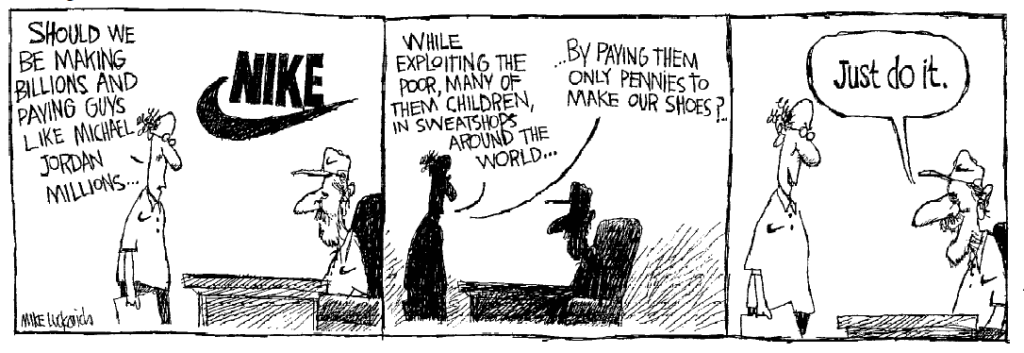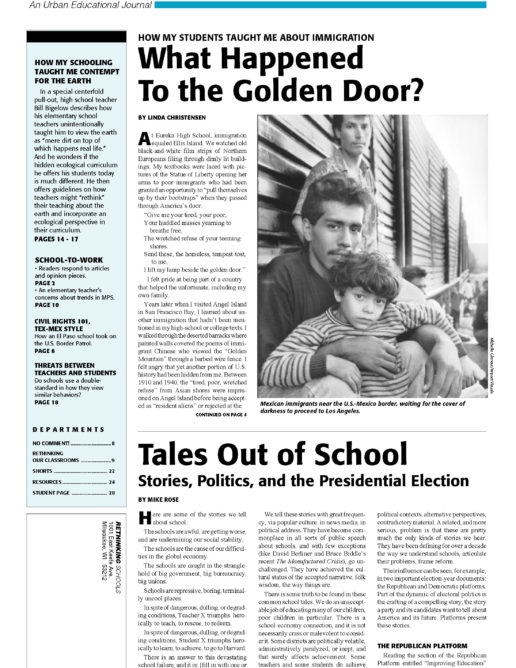Nike Nearly Gets the Boot

PORTLAND, ORE. — When the Nike company contributed $500,000 to the Portland schools, it got just what it didn’t want: more controversy about wages, conditions, and child labor in the factories of its Asian “contractors.”
Nike, headquartered in the Portland suburb of Beaverton, gave the money this spring to the Portland schools, which have cut about $50 million and 200 teachers over the past two years.
Nike’s gift was challenged by Joseph Tam, a School Board member who emigrated in 1972 from Hong Kong, where he had labored in sweat shops as a teen. “I learned that some of Nike’s subcontractors in Pakistan employed children to stitch soccer balls,” Tam said. “I asked myself: Nike contributed this money so my children can have a better education, but at whose expense? At the expense of children who work for six cents an hour. Children were beaten and branded . . .”
“I’m not trying to accuse all the white board members, but in the past, I suspect that no one would come out and say anything other than, ‘Thanks, Nike, you’re such a good corporate citizen.’ Now as an immigrant and an Asian, I have to face this moral and ethical dilemma whether I can accept this $500,000. You cannot just look the other way. We can’t send a message to our children, ‘You are better than the children in Pakistan. You deserve to get the fruits of their labor so you can get better equipment to play ball.’”
Tam submitted a resolution that the donation be accepted only on condition that Nike enter an agreement with independent human rights organizations to monitor the conditions of its Asian factories. Nike refused, just as it had refused previous demands for independent monitoring. Nonetheless, the local newspaper came to Nike’s defense. In two editorials the paper portrayed Nike as a good corporate citizen, urged that the donation be accepted, and attacked Nike opponents as naive and misinformed.
INFORMATIONAL PICKETS
Tam got considerable support from Portland activists: from Jobs with Justice, the East Timor Action Network, and Justice Do It Nike, a group formed by Amnesty America activists when Nike rejected Amnesty’s request to talk about Nike’s responsibility for repression and human rights violations in Indonesia. The coalition staged monthly informational pickets outside “Niketown” stores and several times sat in until the police arrived.
Tam’s resolution triggered school board hearings, in which Nike’s local and international practices came under scrutiny.
Opponents pointed out that Nike aggressively cracks down on some contractor violations (theft, trademark violations) but does little to enforce its code of conduct or discourage crimes against workers (not paying the minimum wage, child labor, debt bondage, “disappearing” of labor organizers and journalists, etc.).
As to Nike’s $500,000, it turned out to be more of an advertising campaign than a donation. Nearly $200,000 of it was given as Nike T-shirts, complete with its messages and symbols, distributed at a June 1 fund-raising march for schools. And the remaining $300,000 was to be used only for athletics.
Although the School Board voted 4-1 in late August to accept the donation without conditions, the protests touched a raw nerve and put Nike on the defensive. Over the summer, for instance, Nike several times announced tighter monitoring of its contractors and joined a U.S. Labor Department Task Force studying how to raise labor standards among Asian apparel contractors. Protests continue against Nike, meanwhile. On Sept. 25, the coalition opposed to the Nike donation sat in at Nike’s newest store. It presented Nike with a “Corporate Greed” award and announced it would continue to demand independent monitoring of Nike’s contractors.

